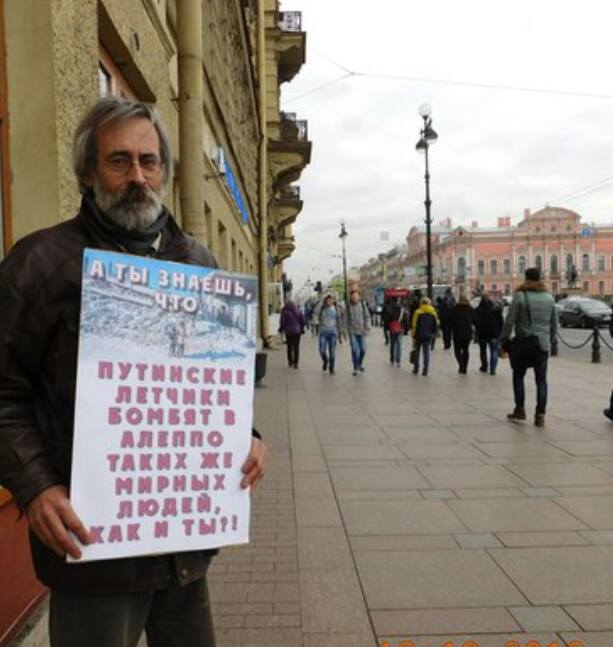
Anti-War Protests in Russia; Anti-Russian Protests in Belarus
Publication: Eurasia Daily Monitor Volume: 13 Issue: 167
By:

The Moscow media—and all too often news outlets in the West—paint Russians as a nation 100 percent behind Vladimir Putin’s war in Syria, and Belarusians as a nation fully behind Russia. But in fact, Russian support for Putin’s aggression and Belarusian support for Russia is much lower than typically reported. Polls show that Russians are less supportive of President Putin today than they were only a few months ago (82 percent in late September compared to 89 percent last June) (RT, September 28). And the statements of Belarusian officials as well as opposition figures underscore that Belarusians view Russia increasingly as a threat than as an ally (Udf.by, September 7). Now, brave people in both countries are increasingly speaking out against Putin’s wars in the first case and against Russia’s pressure in the second.
Over the past year, small groups of demonstrators have repeatedly stood in the streets of Moscow and St. Petersburg with signs denouncing Putin’s aggression in Syria (Uatoday.tv, October 17, 2015). The protesters at these rallies are never particularly numerous (at most a couple hundred individuals), and no one would suggest that they represent anything approaching the majority view of Russians. But the words on their placards almost certainly reflect the views of others who feel the same way but are not yet prepared to risk their jobs (or worse) to speak out against the Kremlin. And because that is so, these cries of despair on the part of the few may ultimately point to a majority movement in the future that will demand a different policy and a different leader.
Last Sunday, October 16, demonstrators held such an anti-war rally in St. Petersburg. The protesters carried signs and placards with slogans such as (Vk.com, Facebook.com/ali.charinskiy, October 16):
- No to a Second Afghan War! Fathers and Mothers of Russia: Do Not Let Yourselves Be Deceived Twice!
- Bombing Aleppo Is a Crime Against Humanity and Not Part of the Struggle Against Terrorism!
- Did You Know That Putin’s Pilots Are Bombing Peaceful Civilians in Aleppo Who Are Just Like You?
- Putin and Assad Are Brothers in Blood.
- Today, Aleppo Is the Target. Could Voronezh or Vladivostok be Tomorrow? As Long as the Kremlin Chooses the Targets, No Life Is Safe.
- If You Say You Are Fighting Terrorism and Then You Bomb Aleppo, You Are a Terrorist!
- Putin and Assad Were Presidents. Now They Are War Criminals.
What is most striking about these slogans is that they link Putin’s aggression in Syria to the situation of ordinary Russians whose sons have died in earlier Moscow campaigns or who may die in this or some other future one. As more Russians die in combat and as news of this spreads through Russia, more ordinary people are likely to draw the same conclusions that the people standing on St. Petersburg’s main street already have.
Similar conclusions can and are likely to be reached by ever more Belarusians in response to a symbolic protest that took place in Brest over the weekend. Several hundred Russians paratroopers from Kostroma have arrived to the city and are slated to take part in a military exercise this week. Their presence infuriated some unknown Belarusians, who put up a banner on the gates of the facility where these foreign soldiers are being housed. The banner read “Russians Go Home!” adding that Putin is “a s**t” (Charter97.org, October 17).
The presence of this paratrooper unit on Belarusian soil is especially controversial because it is widely known that it took part in the Russian invasion of Georgia in 2008 as well as the invasion of Ukraine in 2014. Consequently, as the Belarusian opposition news portal Charter97 put it, “the very appearance of such an odious military formation on the territory of Belarus can be considered on its face an act of aggression, and joint exercises a few kilometers from the border of the EU [European Union] a direct challenge.” Charter97 further asserted that the Kostroma paratroopers’ presence signifies the Belarusian military’s and the Alyaksandr Lukashenka regime’s propensity to act as “Putin’s puppets” (Charter97.org, October 17).
The unrelated but concurrent demonstrations in St. Petersburg and Brest are of course unlikely to lead to any short-term radical changes in the policies of either country. But such actions help change the climate of public opinion. This was true following the actions of the brave protesters in the Baltic countries in the 1980s, the Crimean Tatars in the same decade, and many other nations then and later—including now in Russian-occupied Crimea and elsewhere. As has historically been the case, the voice of a marginalized opposition today can ultimately grow and transform into the thunderous demands of the majority, which these regimes will be unable to ignore.



